Evaluating Brexit's Impact: An Economic Assignment on UK Businesses
VerifiedAdded on 2023/06/12
|11
|2816
|223
Essay
AI Summary
This essay critically evaluates the potential changes in the UK's international environment following Brexit, focusing on economic, political, legal, and cultural dimensions. It highlights the immediate decline in the UK's growth rate and the weakened position of UK businesses in the international market due to the loss of EU support. The analysis covers the impact of fluctuating currency, complicated legal and regulatory frameworks, and trade barriers on international businesses. While acknowledging the adverse consequences, the essay also explores potential benefits such as greater political and economic freedom for the UK. It further discusses the benefits of EU membership, including single market operation and access to the EU custom union, and the challenges faced by various sectors like financial services, creative services, automotive, and pharmaceuticals post-Brexit. The essay concludes by examining the political and legal changes, including reforms in migration and trade policies, and their implications for the UK business environment.
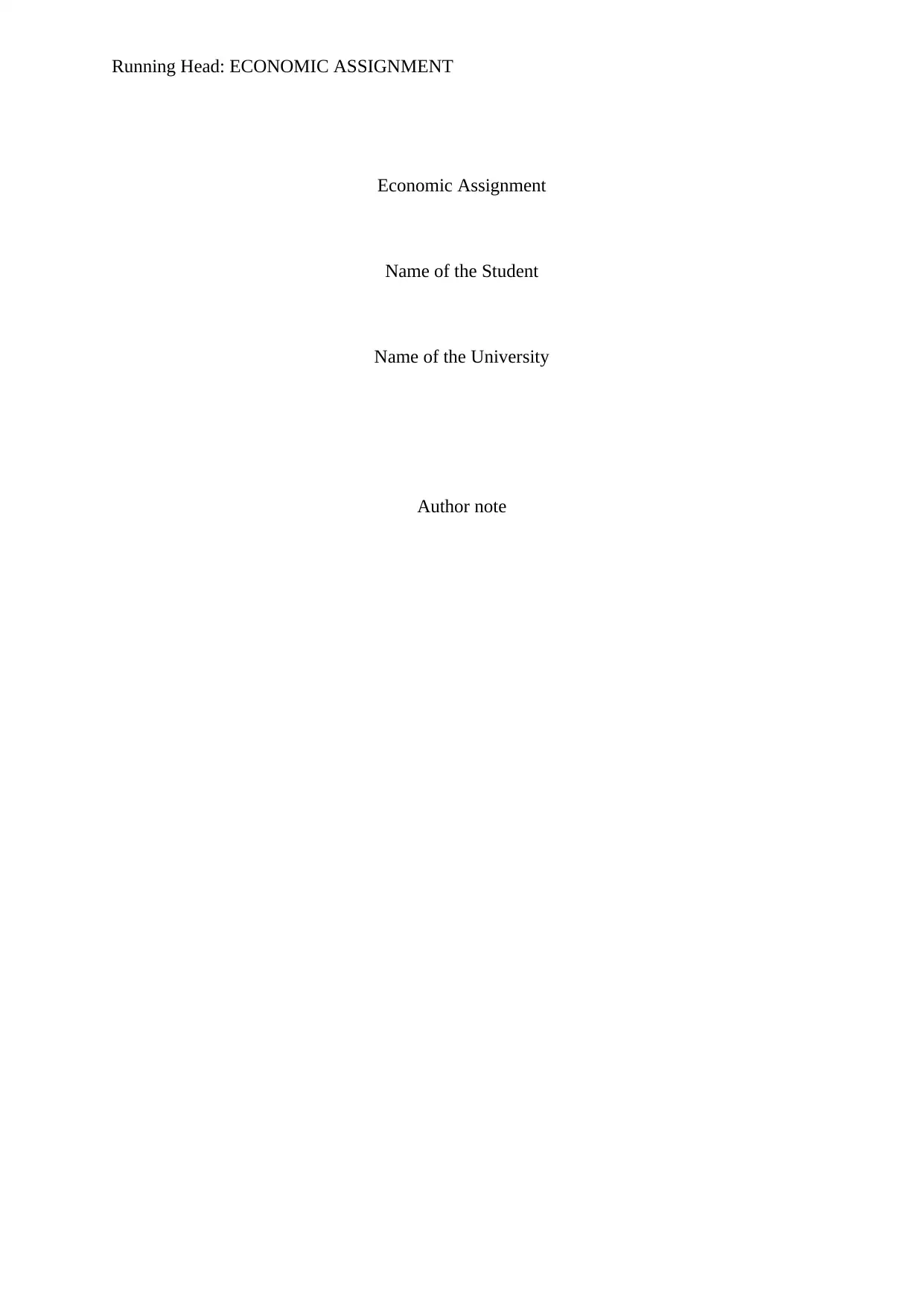
Running Head: ECONOMIC ASSIGNMENT
Economic Assignment
Name of the Student
Name of the University
Author note
Economic Assignment
Name of the Student
Name of the University
Author note
Paraphrase This Document
Need a fresh take? Get an instant paraphrase of this document with our AI Paraphraser
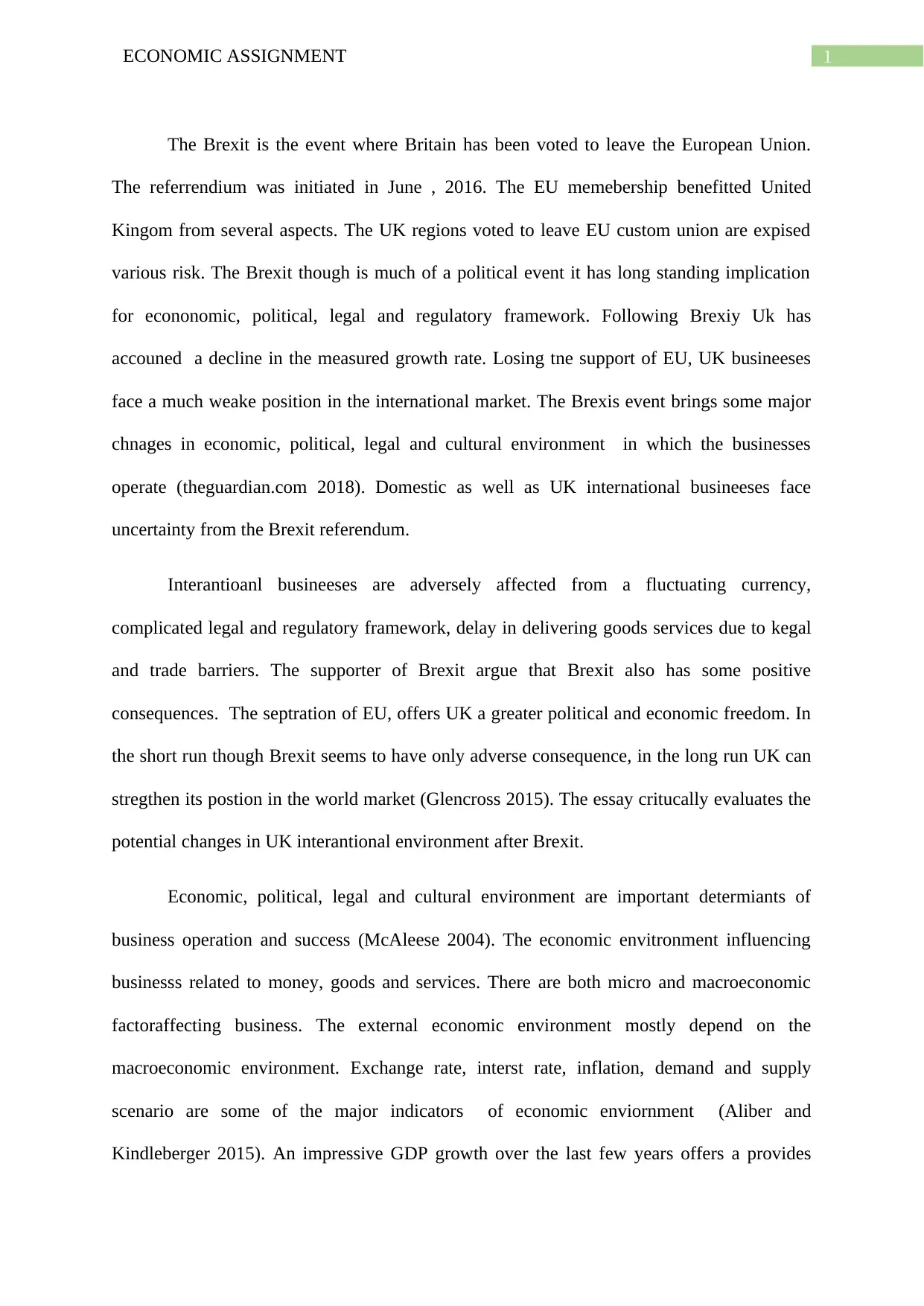
1ECONOMIC ASSIGNMENT
The Brexit is the event where Britain has been voted to leave the European Union.
The referrendium was initiated in June , 2016. The EU memebership benefitted United
Kingom from several aspects. The UK regions voted to leave EU custom union are expised
various risk. The Brexit though is much of a political event it has long standing implication
for econonomic, political, legal and regulatory framework. Following Brexiy Uk has
accouned a decline in the measured growth rate. Losing tne support of EU, UK busineeses
face a much weake position in the international market. The Brexis event brings some major
chnages in economic, political, legal and cultural environment in which the businesses
operate (theguardian.com 2018). Domestic as well as UK international busineeses face
uncertainty from the Brexit referendum.
Interantioanl busineeses are adversely affected from a fluctuating currency,
complicated legal and regulatory framework, delay in delivering goods services due to kegal
and trade barriers. The supporter of Brexit argue that Brexit also has some positive
consequences. The septration of EU, offers UK a greater political and economic freedom. In
the short run though Brexit seems to have only adverse consequence, in the long run UK can
stregthen its postion in the world market (Glencross 2015). The essay critucally evaluates the
potential changes in UK interantional environment after Brexit.
Economic, political, legal and cultural environment are important determiants of
business operation and success (McAleese 2004). The economic envitronment influencing
businesss related to money, goods and services. There are both micro and macroeconomic
factoraffecting business. The external economic environment mostly depend on the
macroeconomic environment. Exchange rate, interst rate, inflation, demand and supply
scenario are some of the major indicators of economic enviornment (Aliber and
Kindleberger 2015). An impressive GDP growth over the last few years offers a provides
The Brexit is the event where Britain has been voted to leave the European Union.
The referrendium was initiated in June , 2016. The EU memebership benefitted United
Kingom from several aspects. The UK regions voted to leave EU custom union are expised
various risk. The Brexit though is much of a political event it has long standing implication
for econonomic, political, legal and regulatory framework. Following Brexiy Uk has
accouned a decline in the measured growth rate. Losing tne support of EU, UK busineeses
face a much weake position in the international market. The Brexis event brings some major
chnages in economic, political, legal and cultural environment in which the businesses
operate (theguardian.com 2018). Domestic as well as UK international busineeses face
uncertainty from the Brexit referendum.
Interantioanl busineeses are adversely affected from a fluctuating currency,
complicated legal and regulatory framework, delay in delivering goods services due to kegal
and trade barriers. The supporter of Brexit argue that Brexit also has some positive
consequences. The septration of EU, offers UK a greater political and economic freedom. In
the short run though Brexit seems to have only adverse consequence, in the long run UK can
stregthen its postion in the world market (Glencross 2015). The essay critucally evaluates the
potential changes in UK interantional environment after Brexit.
Economic, political, legal and cultural environment are important determiants of
business operation and success (McAleese 2004). The economic envitronment influencing
businesss related to money, goods and services. There are both micro and macroeconomic
factoraffecting business. The external economic environment mostly depend on the
macroeconomic environment. Exchange rate, interst rate, inflation, demand and supply
scenario are some of the major indicators of economic enviornment (Aliber and
Kindleberger 2015). An impressive GDP growth over the last few years offers a provides
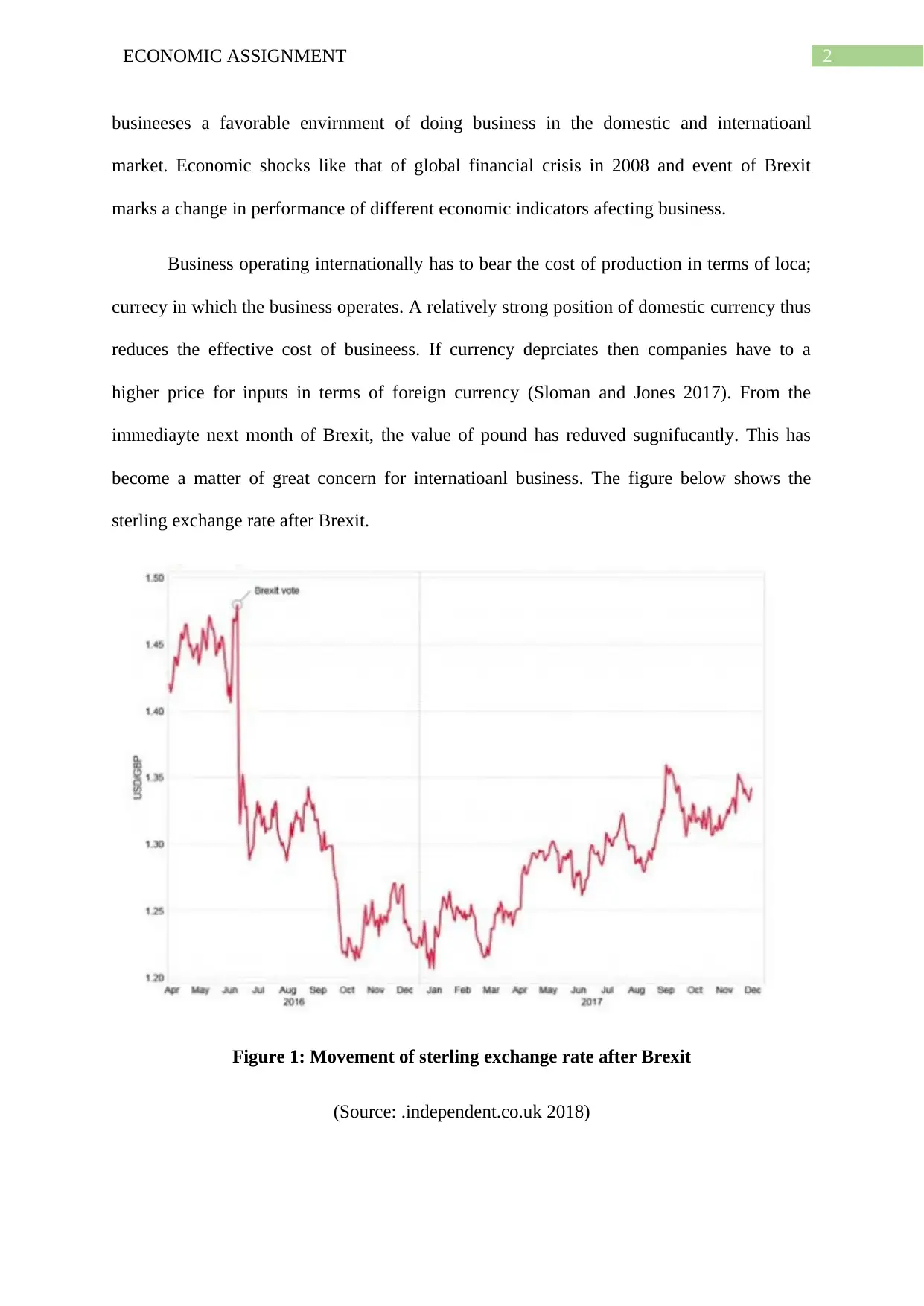
2ECONOMIC ASSIGNMENT
busineeses a favorable envirnment of doing business in the domestic and internatioanl
market. Economic shocks like that of global financial crisis in 2008 and event of Brexit
marks a change in performance of different economic indicators afecting business.
Business operating internationally has to bear the cost of production in terms of loca;
currecy in which the business operates. A relatively strong position of domestic currency thus
reduces the effective cost of busineess. If currency deprciates then companies have to a
higher price for inputs in terms of foreign currency (Sloman and Jones 2017). From the
immediayte next month of Brexit, the value of pound has reduved sugnifucantly. This has
become a matter of great concern for internatioanl business. The figure below shows the
sterling exchange rate after Brexit.
Figure 1: Movement of sterling exchange rate after Brexit
(Source: .independent.co.uk 2018)
busineeses a favorable envirnment of doing business in the domestic and internatioanl
market. Economic shocks like that of global financial crisis in 2008 and event of Brexit
marks a change in performance of different economic indicators afecting business.
Business operating internationally has to bear the cost of production in terms of loca;
currecy in which the business operates. A relatively strong position of domestic currency thus
reduces the effective cost of busineess. If currency deprciates then companies have to a
higher price for inputs in terms of foreign currency (Sloman and Jones 2017). From the
immediayte next month of Brexit, the value of pound has reduved sugnifucantly. This has
become a matter of great concern for internatioanl business. The figure below shows the
sterling exchange rate after Brexit.
Figure 1: Movement of sterling exchange rate after Brexit
(Source: .independent.co.uk 2018)
⊘ This is a preview!⊘
Do you want full access?
Subscribe today to unlock all pages.

Trusted by 1+ million students worldwide
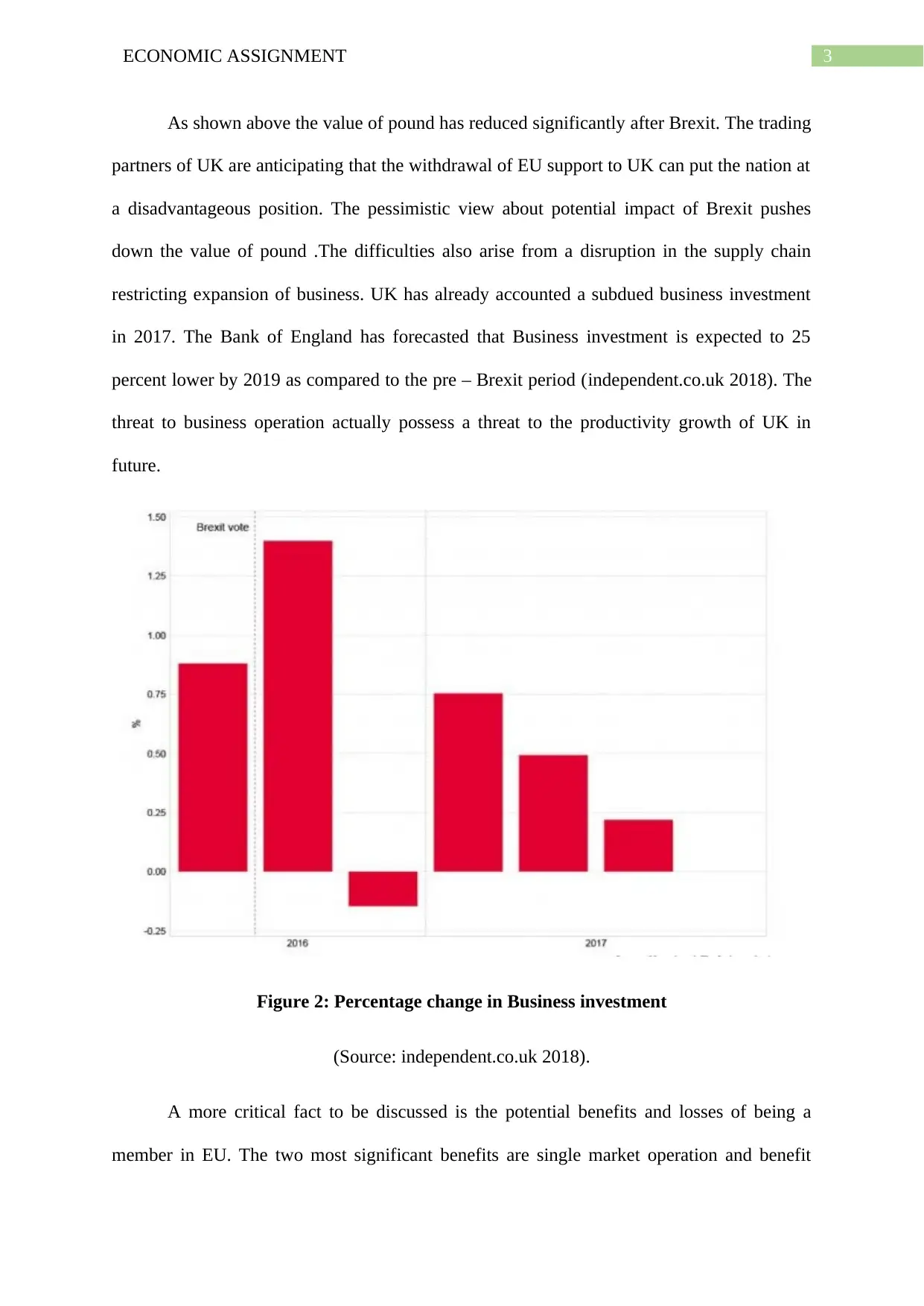
3ECONOMIC ASSIGNMENT
As shown above the value of pound has reduced significantly after Brexit. The trading
partners of UK are anticipating that the withdrawal of EU support to UK can put the nation at
a disadvantageous position. The pessimistic view about potential impact of Brexit pushes
down the value of pound .The difficulties also arise from a disruption in the supply chain
restricting expansion of business. UK has already accounted a subdued business investment
in 2017. The Bank of England has forecasted that Business investment is expected to 25
percent lower by 2019 as compared to the pre – Brexit period (independent.co.uk 2018). The
threat to business operation actually possess a threat to the productivity growth of UK in
future.
Figure 2: Percentage change in Business investment
(Source: independent.co.uk 2018).
A more critical fact to be discussed is the potential benefits and losses of being a
member in EU. The two most significant benefits are single market operation and benefit
As shown above the value of pound has reduced significantly after Brexit. The trading
partners of UK are anticipating that the withdrawal of EU support to UK can put the nation at
a disadvantageous position. The pessimistic view about potential impact of Brexit pushes
down the value of pound .The difficulties also arise from a disruption in the supply chain
restricting expansion of business. UK has already accounted a subdued business investment
in 2017. The Bank of England has forecasted that Business investment is expected to 25
percent lower by 2019 as compared to the pre – Brexit period (independent.co.uk 2018). The
threat to business operation actually possess a threat to the productivity growth of UK in
future.
Figure 2: Percentage change in Business investment
(Source: independent.co.uk 2018).
A more critical fact to be discussed is the potential benefits and losses of being a
member in EU. The two most significant benefits are single market operation and benefit
Paraphrase This Document
Need a fresh take? Get an instant paraphrase of this document with our AI Paraphraser
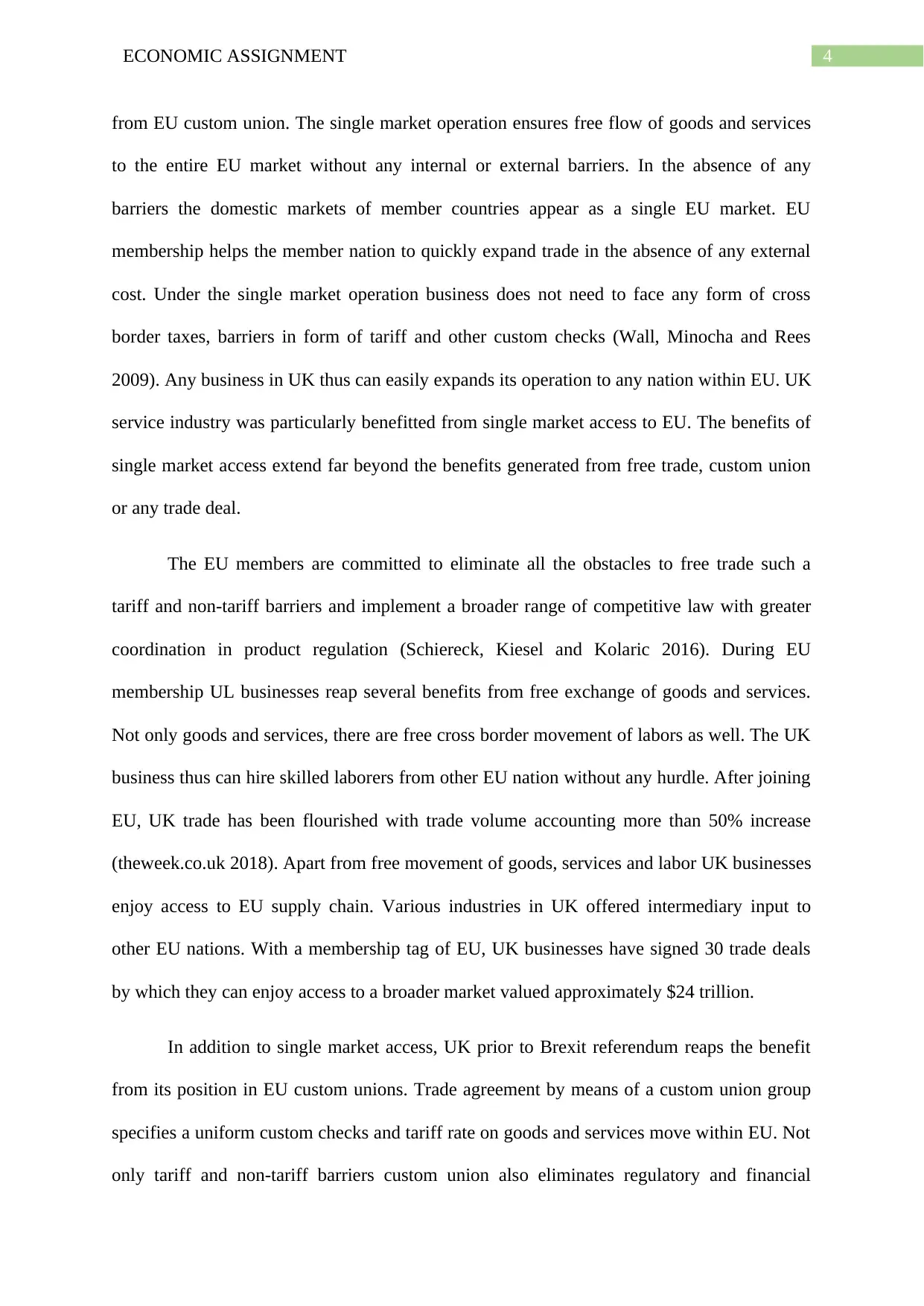
4ECONOMIC ASSIGNMENT
from EU custom union. The single market operation ensures free flow of goods and services
to the entire EU market without any internal or external barriers. In the absence of any
barriers the domestic markets of member countries appear as a single EU market. EU
membership helps the member nation to quickly expand trade in the absence of any external
cost. Under the single market operation business does not need to face any form of cross
border taxes, barriers in form of tariff and other custom checks (Wall, Minocha and Rees
2009). Any business in UK thus can easily expands its operation to any nation within EU. UK
service industry was particularly benefitted from single market access to EU. The benefits of
single market access extend far beyond the benefits generated from free trade, custom union
or any trade deal.
The EU members are committed to eliminate all the obstacles to free trade such a
tariff and non-tariff barriers and implement a broader range of competitive law with greater
coordination in product regulation (Schiereck, Kiesel and Kolaric 2016). During EU
membership UL businesses reap several benefits from free exchange of goods and services.
Not only goods and services, there are free cross border movement of labors as well. The UK
business thus can hire skilled laborers from other EU nation without any hurdle. After joining
EU, UK trade has been flourished with trade volume accounting more than 50% increase
(theweek.co.uk 2018). Apart from free movement of goods, services and labor UK businesses
enjoy access to EU supply chain. Various industries in UK offered intermediary input to
other EU nations. With a membership tag of EU, UK businesses have signed 30 trade deals
by which they can enjoy access to a broader market valued approximately $24 trillion.
In addition to single market access, UK prior to Brexit referendum reaps the benefit
from its position in EU custom unions. Trade agreement by means of a custom union group
specifies a uniform custom checks and tariff rate on goods and services move within EU. Not
only tariff and non-tariff barriers custom union also eliminates regulatory and financial
from EU custom union. The single market operation ensures free flow of goods and services
to the entire EU market without any internal or external barriers. In the absence of any
barriers the domestic markets of member countries appear as a single EU market. EU
membership helps the member nation to quickly expand trade in the absence of any external
cost. Under the single market operation business does not need to face any form of cross
border taxes, barriers in form of tariff and other custom checks (Wall, Minocha and Rees
2009). Any business in UK thus can easily expands its operation to any nation within EU. UK
service industry was particularly benefitted from single market access to EU. The benefits of
single market access extend far beyond the benefits generated from free trade, custom union
or any trade deal.
The EU members are committed to eliminate all the obstacles to free trade such a
tariff and non-tariff barriers and implement a broader range of competitive law with greater
coordination in product regulation (Schiereck, Kiesel and Kolaric 2016). During EU
membership UL businesses reap several benefits from free exchange of goods and services.
Not only goods and services, there are free cross border movement of labors as well. The UK
business thus can hire skilled laborers from other EU nation without any hurdle. After joining
EU, UK trade has been flourished with trade volume accounting more than 50% increase
(theweek.co.uk 2018). Apart from free movement of goods, services and labor UK businesses
enjoy access to EU supply chain. Various industries in UK offered intermediary input to
other EU nations. With a membership tag of EU, UK businesses have signed 30 trade deals
by which they can enjoy access to a broader market valued approximately $24 trillion.
In addition to single market access, UK prior to Brexit referendum reaps the benefit
from its position in EU custom unions. Trade agreement by means of a custom union group
specifies a uniform custom checks and tariff rate on goods and services move within EU. Not
only tariff and non-tariff barriers custom union also eliminates regulatory and financial
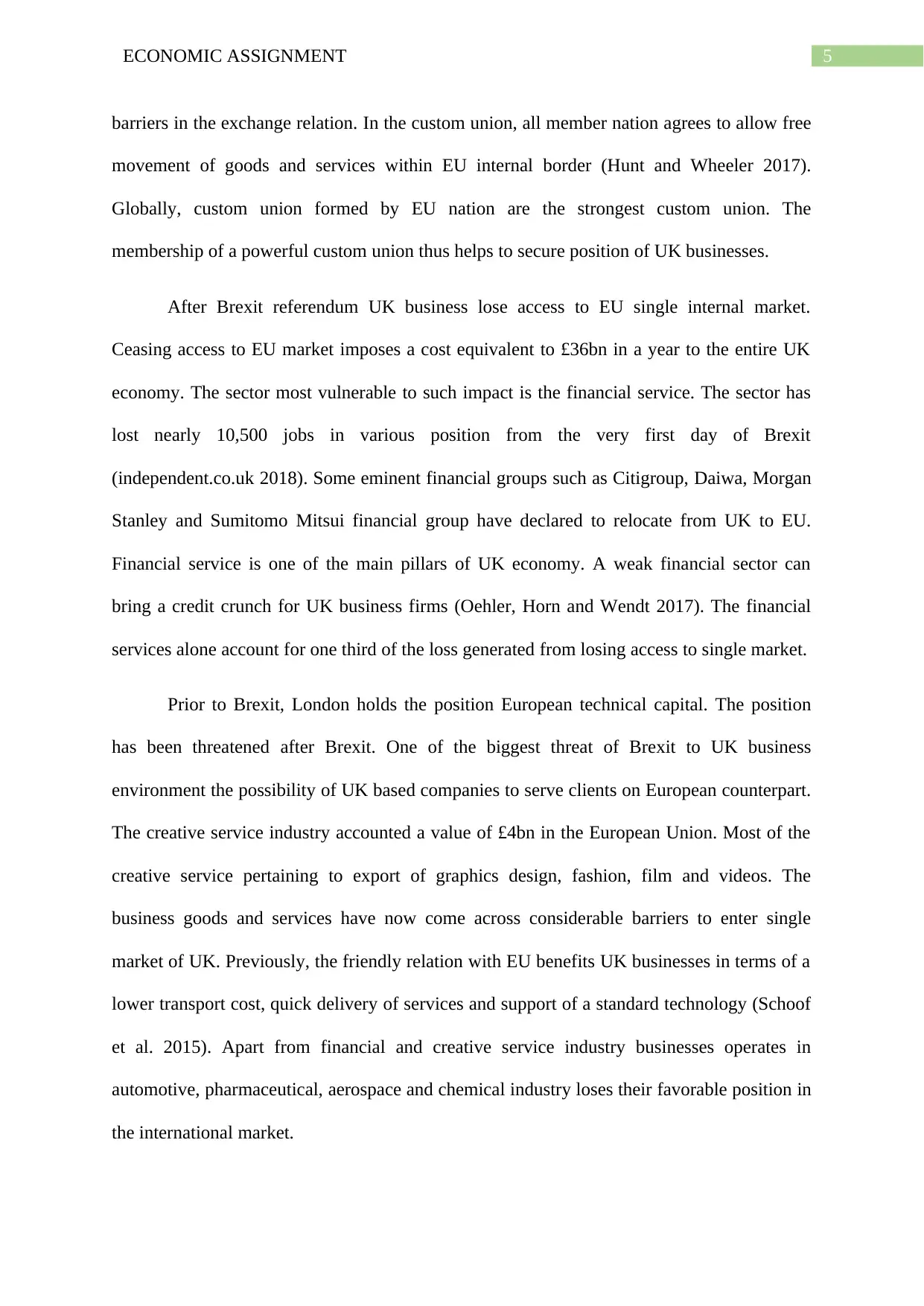
5ECONOMIC ASSIGNMENT
barriers in the exchange relation. In the custom union, all member nation agrees to allow free
movement of goods and services within EU internal border (Hunt and Wheeler 2017).
Globally, custom union formed by EU nation are the strongest custom union. The
membership of a powerful custom union thus helps to secure position of UK businesses.
After Brexit referendum UK business lose access to EU single internal market.
Ceasing access to EU market imposes a cost equivalent to £36bn in a year to the entire UK
economy. The sector most vulnerable to such impact is the financial service. The sector has
lost nearly 10,500 jobs in various position from the very first day of Brexit
(independent.co.uk 2018). Some eminent financial groups such as Citigroup, Daiwa, Morgan
Stanley and Sumitomo Mitsui financial group have declared to relocate from UK to EU.
Financial service is one of the main pillars of UK economy. A weak financial sector can
bring a credit crunch for UK business firms (Oehler, Horn and Wendt 2017). The financial
services alone account for one third of the loss generated from losing access to single market.
Prior to Brexit, London holds the position European technical capital. The position
has been threatened after Brexit. One of the biggest threat of Brexit to UK business
environment the possibility of UK based companies to serve clients on European counterpart.
The creative service industry accounted a value of £4bn in the European Union. Most of the
creative service pertaining to export of graphics design, fashion, film and videos. The
business goods and services have now come across considerable barriers to enter single
market of UK. Previously, the friendly relation with EU benefits UK businesses in terms of a
lower transport cost, quick delivery of services and support of a standard technology (Schoof
et al. 2015). Apart from financial and creative service industry businesses operates in
automotive, pharmaceutical, aerospace and chemical industry loses their favorable position in
the international market.
barriers in the exchange relation. In the custom union, all member nation agrees to allow free
movement of goods and services within EU internal border (Hunt and Wheeler 2017).
Globally, custom union formed by EU nation are the strongest custom union. The
membership of a powerful custom union thus helps to secure position of UK businesses.
After Brexit referendum UK business lose access to EU single internal market.
Ceasing access to EU market imposes a cost equivalent to £36bn in a year to the entire UK
economy. The sector most vulnerable to such impact is the financial service. The sector has
lost nearly 10,500 jobs in various position from the very first day of Brexit
(independent.co.uk 2018). Some eminent financial groups such as Citigroup, Daiwa, Morgan
Stanley and Sumitomo Mitsui financial group have declared to relocate from UK to EU.
Financial service is one of the main pillars of UK economy. A weak financial sector can
bring a credit crunch for UK business firms (Oehler, Horn and Wendt 2017). The financial
services alone account for one third of the loss generated from losing access to single market.
Prior to Brexit, London holds the position European technical capital. The position
has been threatened after Brexit. One of the biggest threat of Brexit to UK business
environment the possibility of UK based companies to serve clients on European counterpart.
The creative service industry accounted a value of £4bn in the European Union. Most of the
creative service pertaining to export of graphics design, fashion, film and videos. The
business goods and services have now come across considerable barriers to enter single
market of UK. Previously, the friendly relation with EU benefits UK businesses in terms of a
lower transport cost, quick delivery of services and support of a standard technology (Schoof
et al. 2015). Apart from financial and creative service industry businesses operates in
automotive, pharmaceutical, aerospace and chemical industry loses their favorable position in
the international market.
⊘ This is a preview!⊘
Do you want full access?
Subscribe today to unlock all pages.

Trusted by 1+ million students worldwide
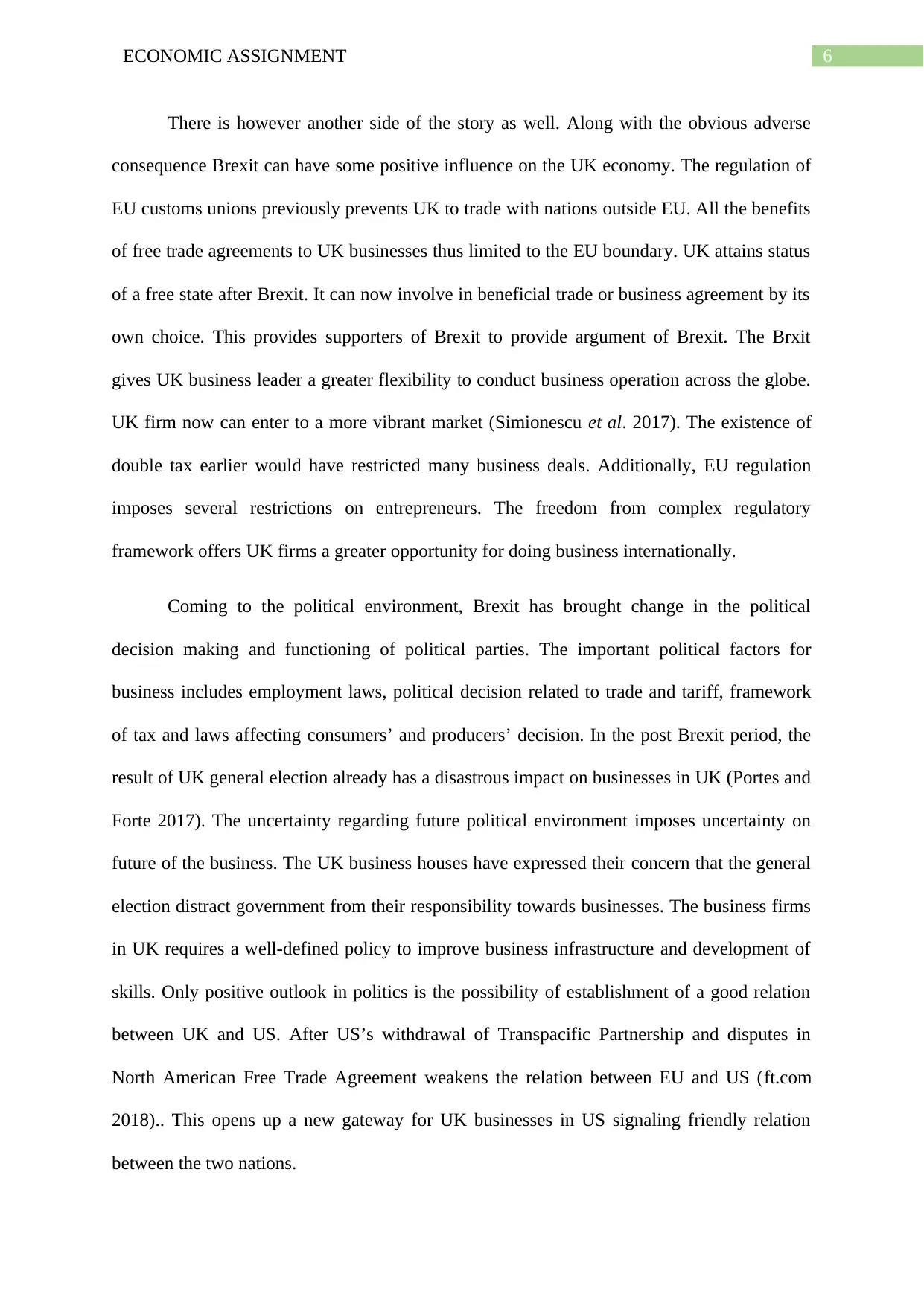
6ECONOMIC ASSIGNMENT
There is however another side of the story as well. Along with the obvious adverse
consequence Brexit can have some positive influence on the UK economy. The regulation of
EU customs unions previously prevents UK to trade with nations outside EU. All the benefits
of free trade agreements to UK businesses thus limited to the EU boundary. UK attains status
of a free state after Brexit. It can now involve in beneficial trade or business agreement by its
own choice. This provides supporters of Brexit to provide argument of Brexit. The Brxit
gives UK business leader a greater flexibility to conduct business operation across the globe.
UK firm now can enter to a more vibrant market (Simionescu et al. 2017). The existence of
double tax earlier would have restricted many business deals. Additionally, EU regulation
imposes several restrictions on entrepreneurs. The freedom from complex regulatory
framework offers UK firms a greater opportunity for doing business internationally.
Coming to the political environment, Brexit has brought change in the political
decision making and functioning of political parties. The important political factors for
business includes employment laws, political decision related to trade and tariff, framework
of tax and laws affecting consumers’ and producers’ decision. In the post Brexit period, the
result of UK general election already has a disastrous impact on businesses in UK (Portes and
Forte 2017). The uncertainty regarding future political environment imposes uncertainty on
future of the business. The UK business houses have expressed their concern that the general
election distract government from their responsibility towards businesses. The business firms
in UK requires a well-defined policy to improve business infrastructure and development of
skills. Only positive outlook in politics is the possibility of establishment of a good relation
between UK and US. After US’s withdrawal of Transpacific Partnership and disputes in
North American Free Trade Agreement weakens the relation between EU and US (ft.com
2018).. This opens up a new gateway for UK businesses in US signaling friendly relation
between the two nations.
There is however another side of the story as well. Along with the obvious adverse
consequence Brexit can have some positive influence on the UK economy. The regulation of
EU customs unions previously prevents UK to trade with nations outside EU. All the benefits
of free trade agreements to UK businesses thus limited to the EU boundary. UK attains status
of a free state after Brexit. It can now involve in beneficial trade or business agreement by its
own choice. This provides supporters of Brexit to provide argument of Brexit. The Brxit
gives UK business leader a greater flexibility to conduct business operation across the globe.
UK firm now can enter to a more vibrant market (Simionescu et al. 2017). The existence of
double tax earlier would have restricted many business deals. Additionally, EU regulation
imposes several restrictions on entrepreneurs. The freedom from complex regulatory
framework offers UK firms a greater opportunity for doing business internationally.
Coming to the political environment, Brexit has brought change in the political
decision making and functioning of political parties. The important political factors for
business includes employment laws, political decision related to trade and tariff, framework
of tax and laws affecting consumers’ and producers’ decision. In the post Brexit period, the
result of UK general election already has a disastrous impact on businesses in UK (Portes and
Forte 2017). The uncertainty regarding future political environment imposes uncertainty on
future of the business. The UK business houses have expressed their concern that the general
election distract government from their responsibility towards businesses. The business firms
in UK requires a well-defined policy to improve business infrastructure and development of
skills. Only positive outlook in politics is the possibility of establishment of a good relation
between UK and US. After US’s withdrawal of Transpacific Partnership and disputes in
North American Free Trade Agreement weakens the relation between EU and US (ft.com
2018).. This opens up a new gateway for UK businesses in US signaling friendly relation
between the two nations.
Paraphrase This Document
Need a fresh take? Get an instant paraphrase of this document with our AI Paraphraser
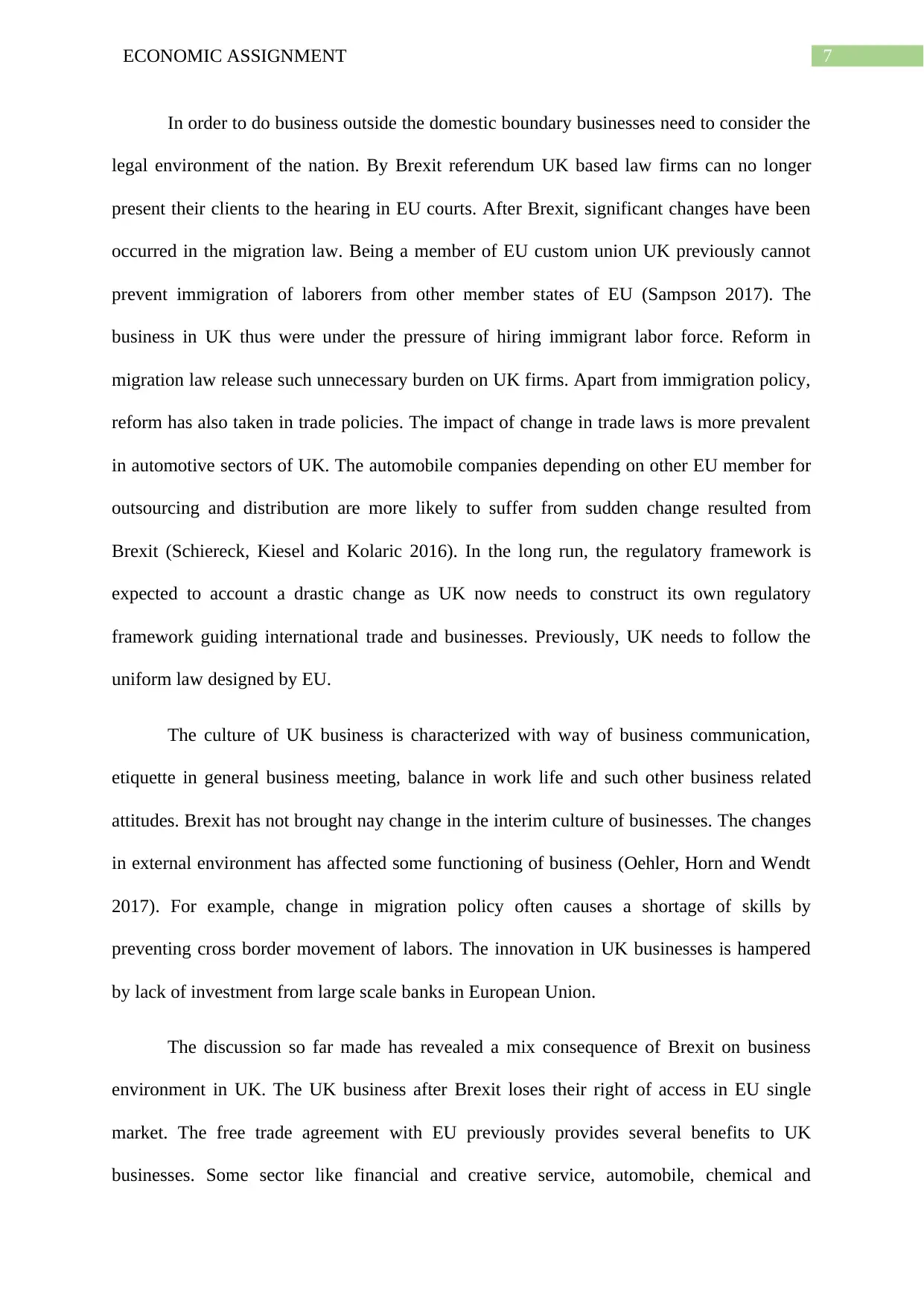
7ECONOMIC ASSIGNMENT
In order to do business outside the domestic boundary businesses need to consider the
legal environment of the nation. By Brexit referendum UK based law firms can no longer
present their clients to the hearing in EU courts. After Brexit, significant changes have been
occurred in the migration law. Being a member of EU custom union UK previously cannot
prevent immigration of laborers from other member states of EU (Sampson 2017). The
business in UK thus were under the pressure of hiring immigrant labor force. Reform in
migration law release such unnecessary burden on UK firms. Apart from immigration policy,
reform has also taken in trade policies. The impact of change in trade laws is more prevalent
in automotive sectors of UK. The automobile companies depending on other EU member for
outsourcing and distribution are more likely to suffer from sudden change resulted from
Brexit (Schiereck, Kiesel and Kolaric 2016). In the long run, the regulatory framework is
expected to account a drastic change as UK now needs to construct its own regulatory
framework guiding international trade and businesses. Previously, UK needs to follow the
uniform law designed by EU.
The culture of UK business is characterized with way of business communication,
etiquette in general business meeting, balance in work life and such other business related
attitudes. Brexit has not brought nay change in the interim culture of businesses. The changes
in external environment has affected some functioning of business (Oehler, Horn and Wendt
2017). For example, change in migration policy often causes a shortage of skills by
preventing cross border movement of labors. The innovation in UK businesses is hampered
by lack of investment from large scale banks in European Union.
The discussion so far made has revealed a mix consequence of Brexit on business
environment in UK. The UK business after Brexit loses their right of access in EU single
market. The free trade agreement with EU previously provides several benefits to UK
businesses. Some sector like financial and creative service, automobile, chemical and
In order to do business outside the domestic boundary businesses need to consider the
legal environment of the nation. By Brexit referendum UK based law firms can no longer
present their clients to the hearing in EU courts. After Brexit, significant changes have been
occurred in the migration law. Being a member of EU custom union UK previously cannot
prevent immigration of laborers from other member states of EU (Sampson 2017). The
business in UK thus were under the pressure of hiring immigrant labor force. Reform in
migration law release such unnecessary burden on UK firms. Apart from immigration policy,
reform has also taken in trade policies. The impact of change in trade laws is more prevalent
in automotive sectors of UK. The automobile companies depending on other EU member for
outsourcing and distribution are more likely to suffer from sudden change resulted from
Brexit (Schiereck, Kiesel and Kolaric 2016). In the long run, the regulatory framework is
expected to account a drastic change as UK now needs to construct its own regulatory
framework guiding international trade and businesses. Previously, UK needs to follow the
uniform law designed by EU.
The culture of UK business is characterized with way of business communication,
etiquette in general business meeting, balance in work life and such other business related
attitudes. Brexit has not brought nay change in the interim culture of businesses. The changes
in external environment has affected some functioning of business (Oehler, Horn and Wendt
2017). For example, change in migration policy often causes a shortage of skills by
preventing cross border movement of labors. The innovation in UK businesses is hampered
by lack of investment from large scale banks in European Union.
The discussion so far made has revealed a mix consequence of Brexit on business
environment in UK. The UK business after Brexit loses their right of access in EU single
market. The free trade agreement with EU previously provides several benefits to UK
businesses. Some sector like financial and creative service, automobile, chemical and
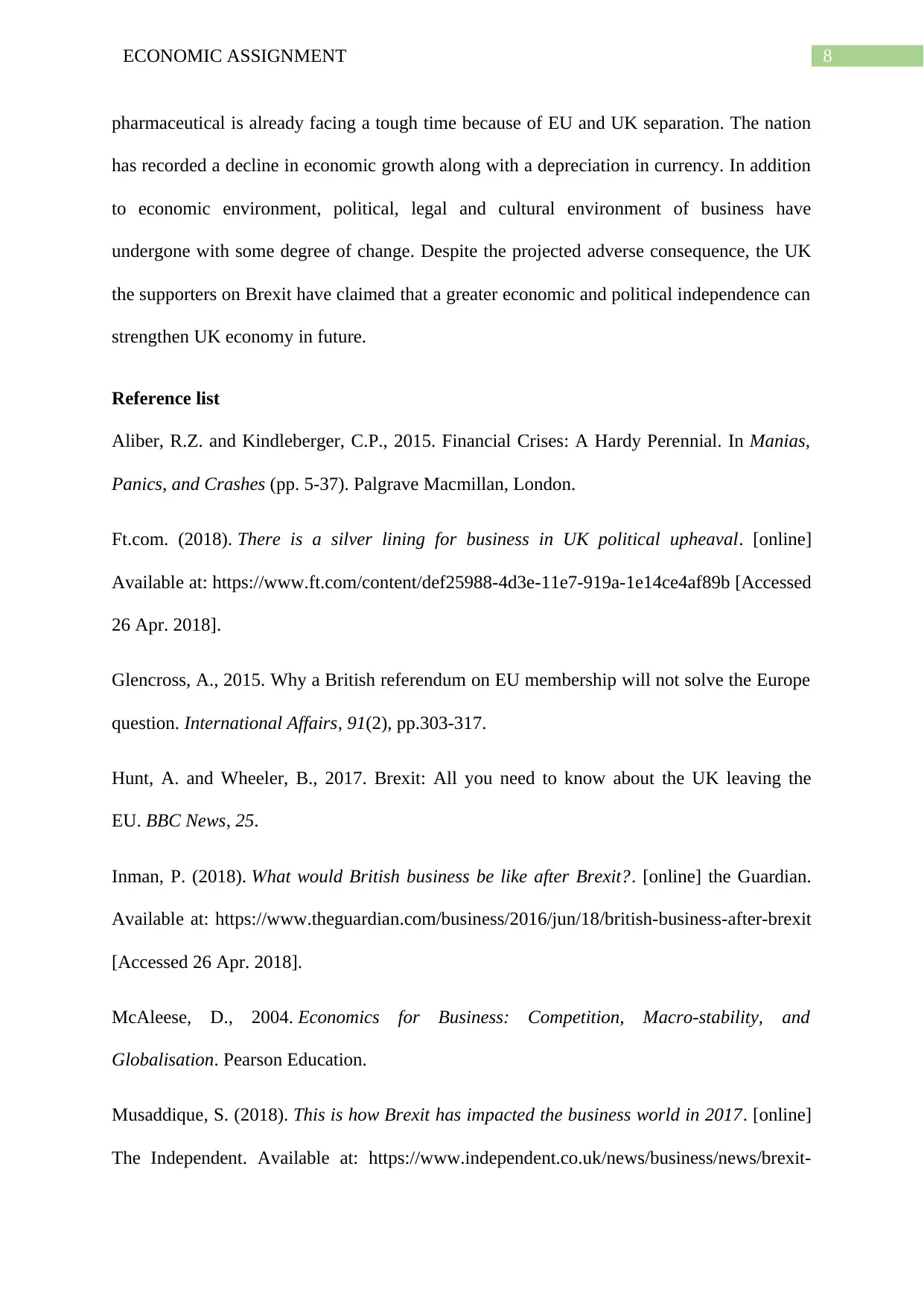
8ECONOMIC ASSIGNMENT
pharmaceutical is already facing a tough time because of EU and UK separation. The nation
has recorded a decline in economic growth along with a depreciation in currency. In addition
to economic environment, political, legal and cultural environment of business have
undergone with some degree of change. Despite the projected adverse consequence, the UK
the supporters on Brexit have claimed that a greater economic and political independence can
strengthen UK economy in future.
Reference list
Aliber, R.Z. and Kindleberger, C.P., 2015. Financial Crises: A Hardy Perennial. In Manias,
Panics, and Crashes (pp. 5-37). Palgrave Macmillan, London.
Ft.com. (2018). There is a silver lining for business in UK political upheaval. [online]
Available at: https://www.ft.com/content/def25988-4d3e-11e7-919a-1e14ce4af89b [Accessed
26 Apr. 2018].
Glencross, A., 2015. Why a British referendum on EU membership will not solve the Europe
question. International Affairs, 91(2), pp.303-317.
Hunt, A. and Wheeler, B., 2017. Brexit: All you need to know about the UK leaving the
EU. BBC News, 25.
Inman, P. (2018). What would British business be like after Brexit?. [online] the Guardian.
Available at: https://www.theguardian.com/business/2016/jun/18/british-business-after-brexit
[Accessed 26 Apr. 2018].
McAleese, D., 2004. Economics for Business: Competition, Macro-stability, and
Globalisation. Pearson Education.
Musaddique, S. (2018). This is how Brexit has impacted the business world in 2017. [online]
The Independent. Available at: https://www.independent.co.uk/news/business/news/brexit-
pharmaceutical is already facing a tough time because of EU and UK separation. The nation
has recorded a decline in economic growth along with a depreciation in currency. In addition
to economic environment, political, legal and cultural environment of business have
undergone with some degree of change. Despite the projected adverse consequence, the UK
the supporters on Brexit have claimed that a greater economic and political independence can
strengthen UK economy in future.
Reference list
Aliber, R.Z. and Kindleberger, C.P., 2015. Financial Crises: A Hardy Perennial. In Manias,
Panics, and Crashes (pp. 5-37). Palgrave Macmillan, London.
Ft.com. (2018). There is a silver lining for business in UK political upheaval. [online]
Available at: https://www.ft.com/content/def25988-4d3e-11e7-919a-1e14ce4af89b [Accessed
26 Apr. 2018].
Glencross, A., 2015. Why a British referendum on EU membership will not solve the Europe
question. International Affairs, 91(2), pp.303-317.
Hunt, A. and Wheeler, B., 2017. Brexit: All you need to know about the UK leaving the
EU. BBC News, 25.
Inman, P. (2018). What would British business be like after Brexit?. [online] the Guardian.
Available at: https://www.theguardian.com/business/2016/jun/18/british-business-after-brexit
[Accessed 26 Apr. 2018].
McAleese, D., 2004. Economics for Business: Competition, Macro-stability, and
Globalisation. Pearson Education.
Musaddique, S. (2018). This is how Brexit has impacted the business world in 2017. [online]
The Independent. Available at: https://www.independent.co.uk/news/business/news/brexit-
⊘ This is a preview!⊘
Do you want full access?
Subscribe today to unlock all pages.

Trusted by 1+ million students worldwide
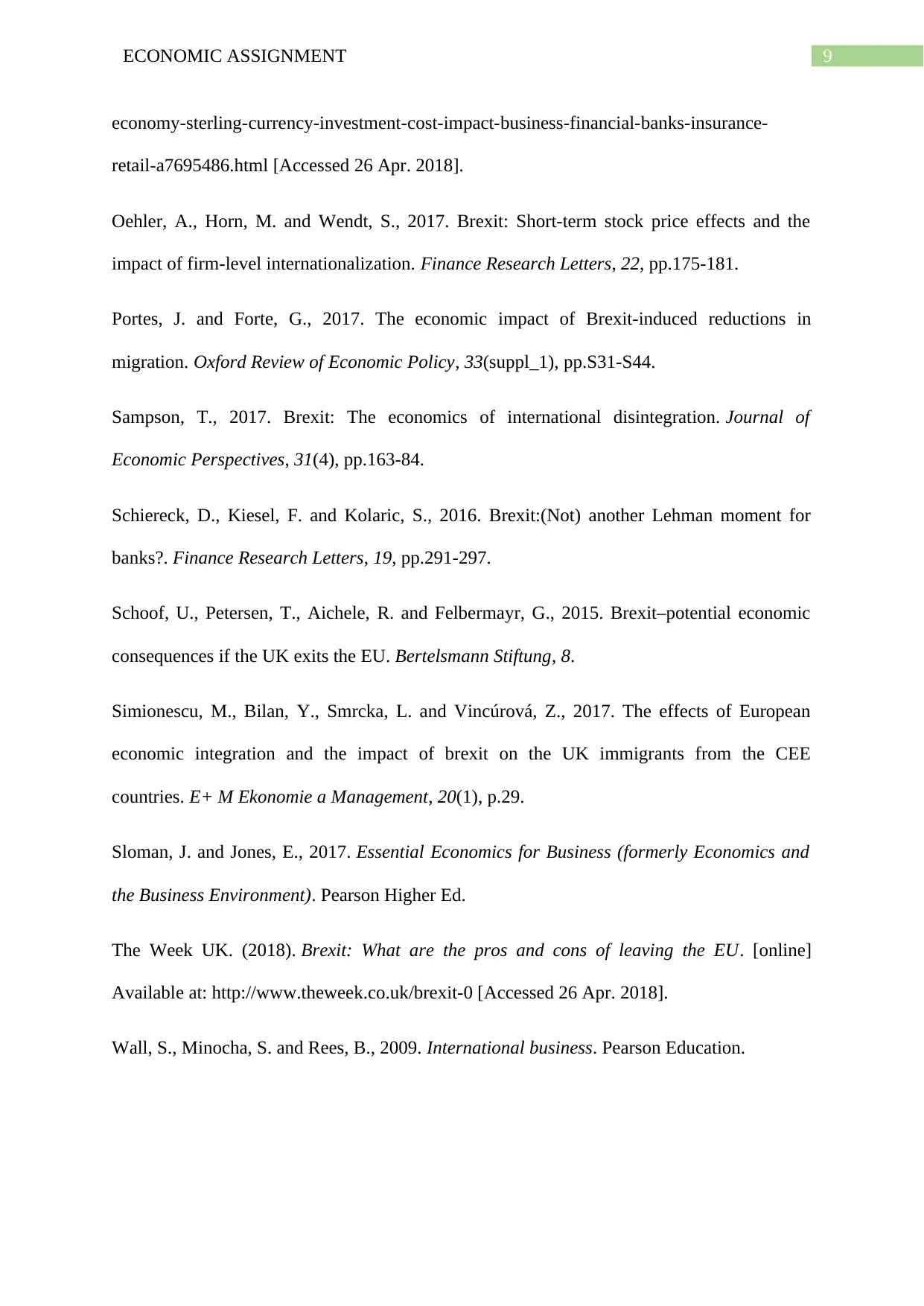
9ECONOMIC ASSIGNMENT
economy-sterling-currency-investment-cost-impact-business-financial-banks-insurance-
retail-a7695486.html [Accessed 26 Apr. 2018].
Oehler, A., Horn, M. and Wendt, S., 2017. Brexit: Short-term stock price effects and the
impact of firm-level internationalization. Finance Research Letters, 22, pp.175-181.
Portes, J. and Forte, G., 2017. The economic impact of Brexit-induced reductions in
migration. Oxford Review of Economic Policy, 33(suppl_1), pp.S31-S44.
Sampson, T., 2017. Brexit: The economics of international disintegration. Journal of
Economic Perspectives, 31(4), pp.163-84.
Schiereck, D., Kiesel, F. and Kolaric, S., 2016. Brexit:(Not) another Lehman moment for
banks?. Finance Research Letters, 19, pp.291-297.
Schoof, U., Petersen, T., Aichele, R. and Felbermayr, G., 2015. Brexit–potential economic
consequences if the UK exits the EU. Bertelsmann Stiftung, 8.
Simionescu, M., Bilan, Y., Smrcka, L. and Vincúrová, Z., 2017. The effects of European
economic integration and the impact of brexit on the UK immigrants from the CEE
countries. E+ M Ekonomie a Management, 20(1), p.29.
Sloman, J. and Jones, E., 2017. Essential Economics for Business (formerly Economics and
the Business Environment). Pearson Higher Ed.
The Week UK. (2018). Brexit: What are the pros and cons of leaving the EU. [online]
Available at: http://www.theweek.co.uk/brexit-0 [Accessed 26 Apr. 2018].
Wall, S., Minocha, S. and Rees, B., 2009. International business. Pearson Education.
economy-sterling-currency-investment-cost-impact-business-financial-banks-insurance-
retail-a7695486.html [Accessed 26 Apr. 2018].
Oehler, A., Horn, M. and Wendt, S., 2017. Brexit: Short-term stock price effects and the
impact of firm-level internationalization. Finance Research Letters, 22, pp.175-181.
Portes, J. and Forte, G., 2017. The economic impact of Brexit-induced reductions in
migration. Oxford Review of Economic Policy, 33(suppl_1), pp.S31-S44.
Sampson, T., 2017. Brexit: The economics of international disintegration. Journal of
Economic Perspectives, 31(4), pp.163-84.
Schiereck, D., Kiesel, F. and Kolaric, S., 2016. Brexit:(Not) another Lehman moment for
banks?. Finance Research Letters, 19, pp.291-297.
Schoof, U., Petersen, T., Aichele, R. and Felbermayr, G., 2015. Brexit–potential economic
consequences if the UK exits the EU. Bertelsmann Stiftung, 8.
Simionescu, M., Bilan, Y., Smrcka, L. and Vincúrová, Z., 2017. The effects of European
economic integration and the impact of brexit on the UK immigrants from the CEE
countries. E+ M Ekonomie a Management, 20(1), p.29.
Sloman, J. and Jones, E., 2017. Essential Economics for Business (formerly Economics and
the Business Environment). Pearson Higher Ed.
The Week UK. (2018). Brexit: What are the pros and cons of leaving the EU. [online]
Available at: http://www.theweek.co.uk/brexit-0 [Accessed 26 Apr. 2018].
Wall, S., Minocha, S. and Rees, B., 2009. International business. Pearson Education.
Paraphrase This Document
Need a fresh take? Get an instant paraphrase of this document with our AI Paraphraser

10ECONOMIC ASSIGNMENT
1 out of 11
Related Documents
Your All-in-One AI-Powered Toolkit for Academic Success.
+13062052269
info@desklib.com
Available 24*7 on WhatsApp / Email
![[object Object]](/_next/static/media/star-bottom.7253800d.svg)
Unlock your academic potential
Copyright © 2020–2026 A2Z Services. All Rights Reserved. Developed and managed by ZUCOL.





